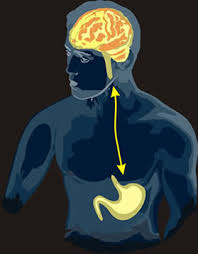Probiotics Improve Your Brain!
by Dr Joseph
Filed under Nutrition, Probiotics
 For many scientist and physicians the observation that the gastrointestinal tract can influence brain function has been difficult to prove. We’ve believed in it and have documented multiple experiences where healing the GI tract has had a positive benefit on disorders affecting the brain (like depression, ADHD and anxiety just to name a few) but still mainstream medicine has completely isolated these two organs apart from each other. Well maybe not anymore!
For many scientist and physicians the observation that the gastrointestinal tract can influence brain function has been difficult to prove. We’ve believed in it and have documented multiple experiences where healing the GI tract has had a positive benefit on disorders affecting the brain (like depression, ADHD and anxiety just to name a few) but still mainstream medicine has completely isolated these two organs apart from each other. Well maybe not anymore!
A new study from UCLA provides the first real hard documented evidence that ingestion of probiotics (good bacteria) can modulate brain activity.
“This is a very important study as up to now most of the evidence that the gut microbiota can influence brain and behavior have emerged from studies in mouse models,” says John Cryan, PhD and Department Head of Anatomy and Neuroscience at University College in Ireland. He further states that this study “gives credence to the idea that we may modulate brain function in disease states by using probiotics.”
The study involved 36 healthy women with no GI or psychiatric symptoms. Twice a day for 4 weeks, 12 women ingested probiotics while the 11 ingested a non-fermented milk product and 13 received no intervention at all. The women underwent a functional Magnetic Resonance Imaging (fMRI) before and after intervention that measured resting brain activity and responses to emotion-recognition tasks
The women ingesting the probiotics had a significant less stress response to emotional stimuli as compared to the two groups that did not. At the same time they also showed greater connectivity between the periaqueductal grey matter and the midbrain; areas responsible for cognition and focus.
“The knowledge that signals are sent from the intestine to the brain and that they can be modulated by a dietary change is likely to lead to an expansion of research aimed at finding new strategies to prevent or treat digestive, mental and neurological disorders,” says Emeran Mayer, MD professor of Medicine and Psychiatry at UCLA.
It sure is nice to see that treatments we have employed and know work for many years backed up by some good rigorous scientific data.
Besides improvement in brain function others studies have shown up to a 30% reduction in the incidence of asthma and allergies in children who have been supplemented with probiotics and recent studies point to probiotics as the cure for colic. I could go on and on with the benefits of a good probiotic.
So should you start a probiotic? Absolutely yes!
I take one on a regular basis and recommend that the majority of my patients take some form of good beneficial bacteria. I recommend products that contain at least 5 different strains and contain a minimum 5 billion colony forming units (CFUs – this measures live active cultures, yogurt is roughly 1 billion CFUs). Refrigeration is also necessary. Those that do not require refrigeration either significantly lose the CFU count while sitting on the shelf or provide dead bacteria all together, so make sure it’s refrigerated.
For children, studies have shown that under the age of two probiotics with a focus on Bifidobacter have more of benefit than Lactobacillus (I recommend Ther-Biotic Infant formula) However after the age of two the microbiota change to Lactobacilli species therefore I recommend Maximum GI Health.
Use the promotional code PROBIOTICS for a 15% discount on any order that includes a probiotic for the month of March. As always Free shipping on all our products.